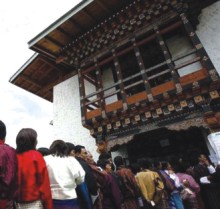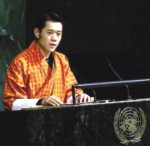|
Neighbours
Bhutan Joins the Democracy Club
 |
Ordinary Bhutanese swarmed the polling stations to vote. |
Last month the whole world quietly watched the first general election ever held in Bhutan. The world's youngest democracy was born. Unlike democracies in other parts of the world, the Bhutanese people didn't have to struggle for their freedom; they were given democracy by their revered king. The people made their choices, and it soon became clear that the royalist party, Druk Phuensum Tshogpa (DPT, or the Bhutan United Party), had won by a landslide 44 of the 47 contested seats. The DPT leader, Jigme Thinley, is a familiar face in the kingdom as he is a two-time prime minister. At first, political observers thought that the People's Democratic Party, led by the present king's uncle, Ngedup, would easily win the election. He served as prime minister twice and has a long political record to boast of. But despite his solid background, somehow the voters felt he did not have the vision to match that of the rival party leader.
So, the verdict is in. The DPT will have a full mandate to carry out extensive and wide-ranging policies and programmes. The party adheres to the principle of "gross national happiness", which seeks to strike a balance between sustainable economic development and personal contentment. Bhutan will continue to follow stringent policies and regulations to protect its pristine environments, but it will increase the annual number of tourists allowed to visit the kingdom. And even under a democratic government, Bhutan will still be guided by its current monarch.
Monday's election was monitored closely by teams of international officials from the US, the EU, Japan, India, Denmark and the UN. All in all, the observers were happy with the outcome of the free and fair election, even though some voters were not able to vote due to late arrival or failure to register in time. Obviously, this first poll should not be compared with those in more mature democracies. Although the two contesting parties had similar platforms, voters made their preferences clear. They like the DPT because the leaders will continue to carry out and follow up on previous government plans and programmes. It provides a sense of security and assurance to the Bhutanese, who have lived under absolute monarchy for the past 100 years.
 |
| Jigme Khesar Namgyel Wangchuck, the King of Bhutan. |
Credit must be given to the far-sightedness of Bhutan's fourth king, Jigme Singye Wangchuck, and the current king, Khesar Namgyel Wangchuck. Both realised that democracy would promote the well-being of the kingdom and its people. It is a wise move for this tiny kingdom to try to cope with the tide of globalisation. Bhutan wants to retain its unique Buddhist culture with an emphasis on happiness. However, the people also know that they cannot ignore the rest of the world. They must integrate and adapt to global development, making certain to protect their unique culture.
As a young democracy, Bhutan needs all the help it can get. To ensure the people are well informed, the media must be able to provide truthful information. So far, the Bhutanese media have done well in covering the election. In the future, the media will need further training to improve skills and professionalism, especially in the public broadcasting service. When the National Assembly begins its deliberations in early April, the media must focus professionally on the proceedings, with analysis of the country's problems and the challenges that lie ahead.
-- By Editorial Desk, The Nation, Thailand.
Reprinted with permission.
Copyright
(R) thedailystar.net 2008 |
